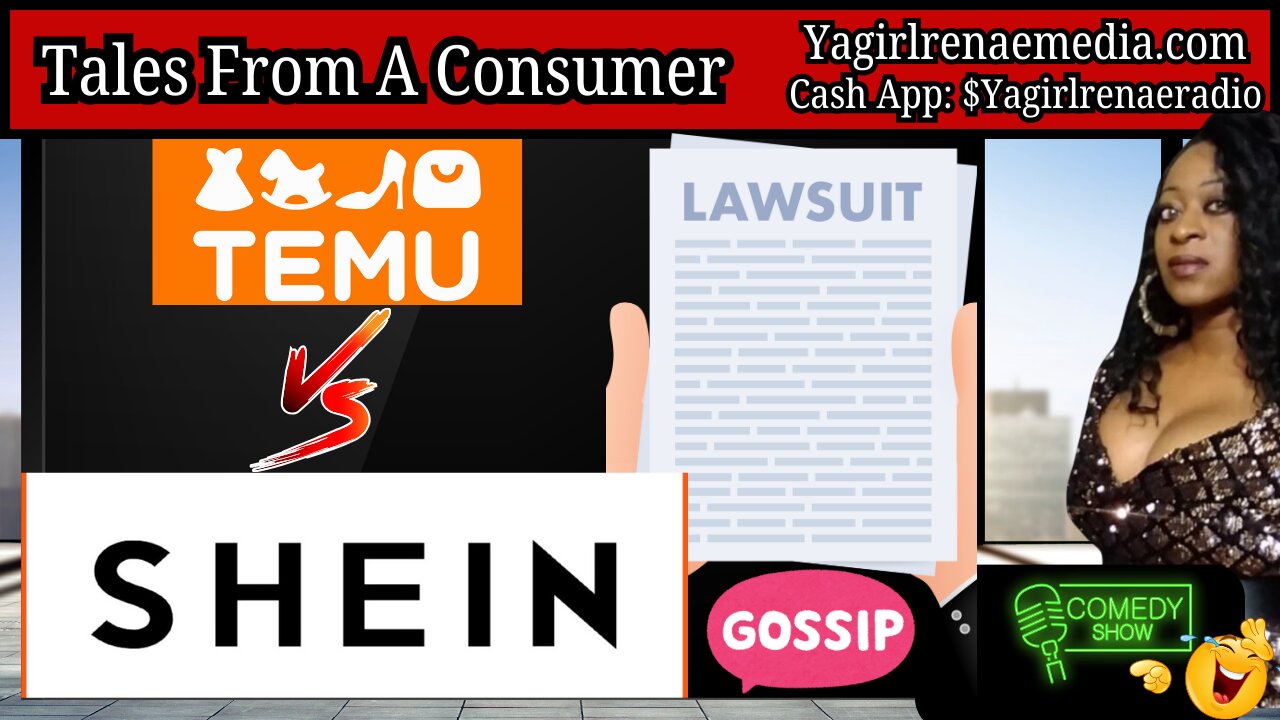Premium Only Content

Temu & Shein Lawsuits!
The world of fast fashion has been shaken by a series of legal battles between two of its biggest players: Shein and Temu. These two companies, both known for their affordable and trendy clothing, have been locked in a legal tug-of-war that has significant implications for the future of the fast fashion industry. The lawsuits filed by and against Shein and Temu are not just about business disputes; they also highlight the broader issues surrounding intellectual property, labor practices, and the ethics of fast fashion.
Background on Shein and Temu
Shein, a Chinese online fast fashion retailer, has grown exponentially in recent years, becoming one of the most popular e-commerce platforms globally. The company is known for its wide range of clothing, accessories, and home goods, all offered at low prices. Shein's success has largely been driven by its ability to quickly produce and ship the latest fashion trends at a fraction of the cost of traditional retailers.
Temu, on the other hand, is a relatively new entrant in the fast fashion market but has quickly gained traction. Launched by Chinese e-commerce giant Pinduoduo, Temu aims to compete directly with Shein by offering similar products at even lower prices. The rapid rise of Temu has not gone unnoticed by Shein, leading to a fierce rivalry between the two companies.
The Lawsuits
The legal battles between Shein and Temu began to surface in 2023 when Shein filed a lawsuit against Temu in a U.S. court, accusing the latter of copying its website design and engaging in unfair business practices. According to Shein, Temu's website bore a striking resemblance to its own, with similar layouts, fonts, and color schemes. Shein argued that Temu's actions were not only a blatant infringement of its intellectual property but also an attempt to confuse consumers and divert traffic away from Shein's website.
In response, Temu countersued Shein, accusing the company of anti-competitive behavior. Temu claimed that Shein was using its dominant market position to stifle competition by pressuring suppliers not to work with Temu and threatening legal action against any company that dared to collaborate with its rival. Temu also alleged that Shein was engaging in a smear campaign, spreading false information about Temu to damage its reputation.
Intellectual Property and the Fast Fashion Industry
The lawsuits between Shein and Temu underscore the broader issue of intellectual property in the fast fashion industry. Fast fashion companies are often criticized for their rapid production cycles, which can result in the copying of designs from high-end fashion brands or independent designers. While fast fashion brands like Shein and Temu are known for their ability to quickly replicate the latest trends, this practice has led to numerous legal disputes over intellectual property rights.
Shein's lawsuit against Temu for copying its website design is just one example of the complex legal landscape surrounding intellectual property in the fast fashion industry. As companies compete to offer the latest styles at the lowest prices, the line between inspiration and imitation can become blurred. This has led to a growing number of lawsuits as brands seek to protect their designs and business practices from being copied by competitors.
Labor Practices and Ethical Concerns
In addition to intellectual property disputes, the lawsuits between Shein and Temu have also brought attention to the labor practices and ethical concerns surrounding fast fashion. Both companies have faced criticism for their reliance on low-cost labor in countries with lax labor laws. Reports of poor working conditions, low wages, and long hours have plagued the fast fashion industry for years, and Shein and Temu are no exceptions.
The lawsuits have also highlighted the environmental impact of fast fashion. The rapid production cycles and low-cost materials used by companies like Shein and Temu result in large amounts of waste and pollution. Critics argue that the fast fashion model is unsustainable and that companies should be held accountable for their environmental footprint.
The Implications of the Legal Battles
The outcome of the legal battles between Shein and Temu could have far-reaching implications for the fast fashion industry. If Shein is successful in its lawsuit against Temu, it could set a precedent for other companies to take legal action against competitors who copy their designs or engage in unfair business practices. This could lead to increased scrutiny of intellectual property rights in the fast fashion industry and potentially slow down the rapid production cycles that have become the norm.
On the other hand, if Temu prevails in its countersuit against Shein, it could challenge the dominance of established fast fashion brands and open the door for new entrants to the market. A victory for Temu could also lead to greater competition in the fast fashion industry, resulting in lower prices for consumers but potentially at the cost of further ethical and environmental concerns.
The Broader Context
The legal disputes between Shein and Temu are just one aspect of the challenges facing the fast fashion industry. As consumers become more aware of the ethical and environmental implications of their purchases, there is growing pressure on fast fashion brands to adopt more sustainable practices. Companies like Shein and Temu are at the center of this debate, as their business models rely on the very practices that are coming under increased scrutiny.
In conclusion, the lawsuits between Shein and Temu are more than just a battle between two fast fashion giants; they are a reflection of the broader issues facing the industry as a whole. As the legal battles unfold, they will not only shape the future of Shein and Temu but also influence the direction of the fast fashion industry in the years to come.
-
 21:43
21:43
Tales From A Consumer
1 month agoDrew Danger Tells Brent Pham To Leave Him Alone & Answers Rican Rangers Questions
166 -
 LIVE
LIVE
RealitySurvival
7 hours agoNorth American Union - Why THIS IS A BAD Idea!
38 watching -
 DVR
DVR
Redacted News
3 hours agoWEF is in FULL PANIC MODE over Trump, LA wildfires a failure of liberal government | Redacted News
53.4K103 -
 DVR
DVR
vivafrei
7 hours agoInterview with Enrique Tarrio's Mother - Viva Frei Live
54.8K19 -
 53:07
53:07
Candace Show Podcast
2 hours agoBlake Lively VS Justin Baldoni: The Revenge of #MeToo | Candace Ep 128
45K43 -
 1:59:04
1:59:04
Darkhorse Podcast
5 hours agoThe 259th Evolutionary Lens with Bret Weinstein and Heather Heying
31.7K18 -
 1:42:19
1:42:19
Film Threat
4 hours agoHOLLYWOOD IS ON FIRE! | Hollywood on the Rocks
10.3K1 -
 9:53
9:53
Gun Owners Of America
4 hours agoConstitutional Concealed Carry Reciprocity Introduced to Congress!
27.6K8 -
 1:52:31
1:52:31
The Quartering
5 hours agoTrump Hotel Attack Planned With ChatGPT, Wildfires Rage & Liberals Celebrate, Biden Roasts Kamala!
74.2K31 -
 12:51
12:51
Chef Donny
4 hours agoTossing Coach Jon Gruden A Caesar Salad | What's For Lunch
25.8K1